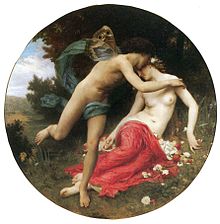Zephyr
In Greek mythology, Zephyrus (in Greek Ζέφυρος, Zéphyros) was the god of the west wind, son of Astraeus and Eos, or of Gaea, according to one author. Zephyrus, "sweet-breathed", was the softest of all and was known as the fructifying wind, messenger of spring. It was believed to have lived in a Thracian cave. In Homeric texts it is considered the fastest of all the winds.
In different stories it was narrated that Cefiro had several wives. On one occasion he is represented as the husband of Iris, the goddess of the rainbow with whom they had Poto or even Eros.He kidnapped another of her sisters, the goddess Chloris, to whom he gave dominion over flowers; from this allegorical union Carpo ('fruit') was born.It was said that he had competed for the love of Chloris with his brother Boreas, whom he ended up winning. It is also said of him that with another of his sisters and lovers, the harpy Podarge, he was the father of Balio and Xanthos, Achilles' horses. Although another author, on the other hand, tells us that Céfiro was the father of the horse Arion, in his union with another of the Harpies. It is even said that he fathered the tigers.
One of the preserved myths in which Zephyr appears most prominently is that of Hyacinthus, a handsome and athletic Spartan prince. Zephyr fell in love with him and courted him, just like Apollo. Both competed for the boy's love, he chose Apollo, and Céfiro went mad with jealousy. Later, upon catching them practicing throwing a discus, Céfiro sent a gust of wind at them, and the disc, as it fell, hit Jacinto on the head, who died. With the blood of the dead boy, Apollo would make the homonymous flower.
In the story of Cupid and Psyche, it was Zephyr who served Eros by transporting Psyche to her cave.
He is represented as a young man, with butterfly or fairy wings, beardless, semi-naked and barefoot, partly covered by a cloak held in his hands, from which he carries and spreads a large number of flowers.
His equivalent in Roman mythology was Favonius (Favonius, 'favourable'), who held dominion over plants and flowers. His name was very common in Ancient Rome.
Several authors have attested to at least two temples where he was worshipped, one in Rhodes and another in Attica.
Contenido relacionado
Eros (disambiguation)
Pandarean
Aegeon
